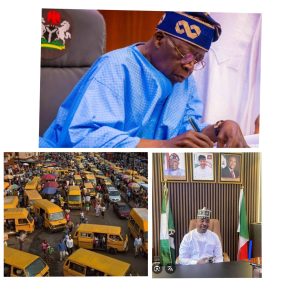
The World Bank has cautioned that further delay in removing the fuel subsidy which had been described as a major drain and waste on the economy could see the federal and state governments unable to pay salaries from 2022.
The Lead Economist, Nigeria Country office of the World Bank, Marco Antonio Hernandez, painted a gloomy picture of Nigeria if the country decides to continue with the controversial fuel subsidy, while unveiling the Nigeria Development Update (NDU), a bi-annual report of the multilateral institution, at an even that held in Abuja as well as virtual.
Also, the Group Managing Director of the Nigerian National Petroleum Corporation (NNPC), Mallam Mele Kyari, during a panel session at the event, lamented the huge burden the continuous retention of the subsidy on petrol had been to the corporation, warning that going forward, “the NNPC may have to start invoicing the federation to be able to maintain subsidy
This is just as the Minister of Finance, Budget and National Planning, Mrs. Zainab Ahmed, reiterated that the government was working on introducing measures that would cushion the impact of fuel subsidy on vulnerable Nigerians.
Speaking further, the Hernandez, in the report, urged Nigeria to remove subsidy on petroleum motor spirit (PMS) in February 2022, as prescribed by the Petroleum Industry Act (PIA), warning that further delay could worsen the precarious revenue situation confronting the country.
The report also warned that the present fiscal condition of the sub-national governments would take a turn for the worse in 2022 with 35 of the 36 states unable to meet their financial obligations.
Hernandez stated that a situation where N250 billion goes into fuel subsidy monthly was unsustainable as the paucity of revenue confronts the country, especially the sub-national governments.
Hernandez who provided insights into the NDU report, titled “Time for Business Unusual,” stated that should the current revenue challenge continue till 2022, only Lagos State would be able to meet its financial obligations.
The report pointed to mounting fiscal pressures due to lower-than-expected revenues in 2021 and the rising cost of PMS subsidy.
It stated: “Because most states rely heavily on inter-governmental transfers, diminished revenue inflows to the Federation Account are jeopardising fiscal sustainability at the state level.
“For example, in the oil-producing State of Bayelsa federal transfers account for 91 per cent of revenues, and declining transfers caused a 22-percent drop in Bayelsa’s revenues per capita during the year.
“Even in the state of Lagos, which relies the least on Federal transfers, transfers accounted for 29 per cent of revenues in 2020. Most State expenditures cover salaries and administrative expenses, and given their rigid (i.e., nondiscretionary) nature, State-level expenditures are difficult to cut.
“Consequently, lower revenues are likely to intensify pressure on states’ debt stocks and undermine their fiscal sustainability.”
According to the report, in contrast to past periods of high oil prices, the Nigerian government has this time not been able to fully benefit from the oil boom because oil production has fallen below Nigeria’s estimated capacity and the Organisationof Petroleum Countries (OPEC) quota due in part to rising insecurity and the higher cost of the PMS subsidy.
It stated: “In 2022 the federal government plans to spend about 3,000 naira (US$7) per person for health, while the cost of the PMS subsidy for next year could reach 13,000 naira (US$32) per person. Not only is the PMS subsidy costly, but it mainly benefits richer households.
“Nigeria has the opportunity to establish a “compact” with citizens that eliminates the subsidy and uses the savings to provide targeted cash transfers to lower-income-households, invest in job-creating programs, and improve its fiscal position.”
It stated that the insufficient supply of foreign exchange (FX) issues related to the predictability of exchange rate management, the unsustainable subsidy on premium motor spirit (PMS), burdensome trade restrictions, and the sizeable fiscal deficit financing by the Central Bank of Nigeria (CBN) are undermining the business environment, compounding underlying constraints on domestic revenue mobilisation, foreign investment, human capital development, and the delivery of public services.
The report noted that despite a strong initial recovery and resurgent global oil prices, Nigeria’s pre-crisis challenges were threatening its post-crisis recovery, highlighting the need to depart from business-as-usual policies.
“Even though Nigeria’s economy exited a pandemic-induced recession, several challenges persist including double-digit inflation, declining incomes, and rising insecurity.
“While the government took bold policy measures to mitigate the impacts of the COVID-19 crisis, the reform momentum has slowed which hinders Nigeria’s ability to reach its growth potential,” World Bank Country Director for Nigeria, Shubham Chaudhuri said.
The report prescribed policy options for Nigeria, including addressing fiscal pressures.
“Urgent priorities for the next three to six months include reducing inflation, improving exchange-rate management, mobilising additional oil and nonoil revenues, eliminating the PMS subsidy and redirecting expenditures towards targeted cash transfers and other priority investments, fostering competitive markets, and improving infrastructure.
“While Nigeria’s macroeconomic projections have been updated since the previous edition of the NDU, the government’s fundamental policy challenges remain unchanged,” it added.
In his contribution, Kyari, pointed out that while all over the world, subsidies are introduced to bring cost control and less pains to citizens, in Nigeria, fuel subsidy has become a major fiscal burden that must be eliminated.
The NNPC boss explained: “Today, we are evacuating about 60 million litres of gasoline from all the depots in the country. It is not national consumption and it is very understandable because of issues such as cross-border smuggling.
“As long as you have arbitrage, traders don’t see it as a crime, they just take advantage of that and exploit it. What we are dealing with is about N243 billion of fuel subsidy monthly. So, there is no magic around that.
“This is the reality that we are facing. Going forward in 2022, we simply cannot afford this, we just don’t have the resources. As a matter of fact, the NNPC may have to start invoicing the federation to be able to maintain subsidy.
“When you take out N243 billion from your total income every month, you are not able to fund your operations and so you can’t meet your other fiscal obligations. Clearly, there is a challenge in the ability to pay. So, there is a reform going on, particular in the energy sector and no one can stop.”
Also, the Governor of Kaduna State, Mallam Nasir El-Rufai wondered why the country would continue to allocate more monies to fuel subsidy compared with the allocations to education, roads and the health sectors.
“Is subsidising petrol more important than our health as even in a year we spent significant amount on health due to the pandemic, the budget for subsidy was still higher? Does it make sense?
“Is subsidising petrol about thrice as educating our children and preparing them for the future more important? The capital budget for roads is five times less than our budget for subsidy. We have to ask ourselves as Nigerians whether this makes sense at all,” he added.
According to El-Rufai, “this is the first time in Nigeria that oil prices are rising globally, yet, there is no windfall. In fact, we are getting less. Why? Because according to Kyari, subsidy is taking N250 billion per month.”
He disclosed that this month, what the NNPC paid to the federation account, as part of its contribution to the amount to be shared by the Federation Account Allocation Committee (FAAC), was only N14 billion as against the N120 billion stipulated in the budget, and, “with the threat that next month they would ask the federation account to give them a cheque to cover subsidy.”
“So, we have to ask ourselves if this subsidy still makes sense. Who is benefiting from it other than the smugglers and neighbouring African countries and some rich people? We have to stop this thing that will bring Nigeria to its knees,” the state governor added.
Earlier, in her opening remarks, Ahmed expressed optimism that recent developments in the oil sector, such as the Petroleum PIA 2021, the full reactivation of the four public refineries in the country, and the completion and coming on stream of the three private refineries under construction in 2022, would significantly boost contribution from the sector to economic growth.
According to her, subsidies’ regime in the sector remained unsustainable and economically disingenuous.
She disclosed that ahead of the target date of mid-2022 for the complete elimination of fuel subsidies, the government was working with its partners on measures to cushion potential negative impact of the removal of the subsidies on the most vulnerable at the bottom, which she estimated to be 40 per cent of the population.
“One of such measures would be to institute a monthly transport subsidy in the form of cash transfer of N5,000 to between 30 – 40 million deserving Nigerians.
“As a government, we remain committed to our broad objectives of stimulating broad-based growth through diversification and the active participation of the private sector to ensure that our growth is inclusive.
“We will continue to prioritise investment in critical infrastructure needed to unlock production and supply constraints, to create adequate productive employment and preserve jobs, and to ensure macroeconomic stability and promote poverty reduction and equity.
“I agree with the Report that with the expansion of social protection policies during the pandemic, the government has an opportunity to phase out subsidies such as the PMS subsidy while utilising cash transfers to safeguard the welfare of poor and middle-class households.
“Towards this end, we intend to accelerate our structural reforms, particularly in the power sector, in governance, in business environment to unlock the huge potentials of the economy, scale up social safety net and deepen financial inclusion to reduce poverty and inequality gaps. We will carefully calibrate the sequencing of these reforms to manage their attendant political fallouts,” she added.
Ahmed pointed out that digital revolution was looming in Nigeria and waiting to happen spontaneously.
“I agree that Nigeria’s digital economy can transform economic activities by unleashing new productivity gains, offering new services, and improving the government’s efficiency. We see enormous opportunity for our theming youth population in this sector which has largely remained unharnessed with isolated progress and possibilities.
“We need greater investments in newer and competitive technologies to be made for the provision of critical infrastructure in the telecoms sector to unleash potentials.
“To protect such investments, government has been mobilising national security outfits, and even local ‘vigilantes’ to provide added layers of security for the infrastructure, while at same time engaging local communities towards addressing the likely root causes of cases of infrastructure vandalisation,” she added.




前往电报中文版下载,了解这款注重隐私的即时通讯应用。体验其安全、快速和便捷。